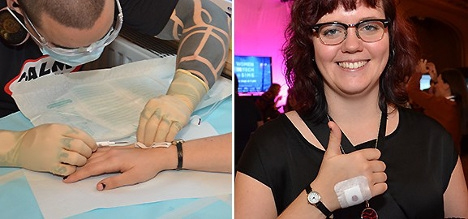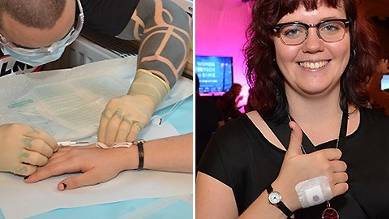’I’m among the first Swedes with a microchip’
Source: thelocal.se

Sweden has a global reputation as a leader in developing innovative technologies. But will a trend for inserting microchips in the human body catch on? The Local spoke to one of the first Swedes to choose an implant to unlock her office door.
Emilott Lantz, 25, from Umeå in northern Sweden, got a microchip inserted into her hand last week.
She became a guinea pig during Sime 2014 in Stockholm – a conference about digitalism, the internet, and the future. In line with the goals of the event, participants were offered to get a microchip fitted for free – an opportunity Lantz jumped at.
“I don’t feel as though this is the future – this is the present. To me, it’s weird that we haven’t seen this sooner,” she tells The Local.
There is evidence that the number of chip-wearers in Sweden is growing rapidly.
"This has very much been an underground phenomenon up until now, but there are perhaps a 100 people with the chip in Sweden," says Hannes Sjöblad from the Swedish biohackers group BioNyfiken.
In the last month alone 50 people from the group underwent the procedure.
The technology has previously been used for key tags or chips in our pets’ necks to let them through cat flaps. What is relatively new is inserting the chip in human hands.
The idea is that instead of carrying keys or remembering pins or passwords for our phones or doors, people fitted with microchips can use them to unlock rooms or lockers, by placing their hand against a machine that reads the information stored in the chip.
It was the appeal of minimizing the number of keys she needed to carry around that was the deciding factor for Lantz.
But her decision to go through with the procedure has brought mixed reactions from her friends and family, some saying she’s been foolish while others argue it’s a cool idea.
“The technology isn’t new but the subject becomes sensitive just because it’s in the human body,” she says.
X-ray of microchip in hand
X-ray of microchip in human hand, shown at Sime 2014. Photo: Mikael Hansson/InfoTech Umeå
The chip, which is the size of a grain of rice, has been designed to stay in Lantz’s hand for the rest of her life.
“I’m not surprised that people think it’s a big deal – it’s not that common yet, but I think it will be. We’re already modifying our bodies, why should this be different?”
Lantz first came in contact with the idea while attending the conference Geek Girl Meetups last year, where she heard speaker Carin Ism talk about transhumanism.
Transhumanism is a movement that explores science and technology innovations and their relationship to humanity. Its goal is to challenge humanity by using emerging technologies that enable humans to go beyond their current limitations.
“I’m super stoked to have had this done – I can’t wait for the property agent to get back to me about letting me into the system so that I can use my chip instead of my keys to get into the office,” says Lantz.
BioNyfiken’s Hannes Sjöblad says it makes sense that Sweden is starting to embrace the technology.
"There’s a reason that this is happening in Sweden first and not anywhere else. Swedes have a proven track record of being very early adapters of new technologies and the current mood is very conductive to this type of experimenting," he says.
Lantz adds: “besides having a chip in my hand, I’m a pretty normal person."
Source: thelocal.se






















